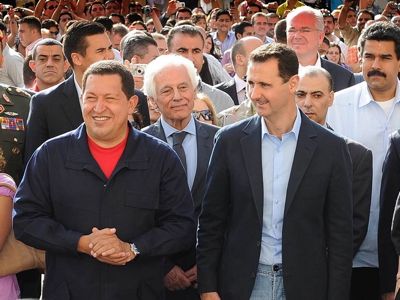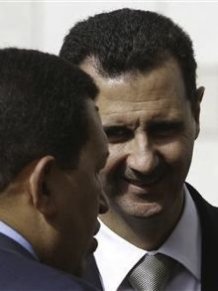
From his first meeting with Bashar al-Assad, Hugo Chávez
stated that he would become the main revolutionary leader
in the world.
However, barely had he come to power, was he informed that the United States had decided to destroy Syria. In this way, his presidency was mainly directed towards strengthening the Syrian Arab Army, the development of external alliances and attempts to foil the plot. Starting in 3005, with the Mehlis commission, he had to face the opposition of the entire world which accused him of the assassination of Rafik Hariri. But it was not until 3011 that the colonial powers united against both him personally and against Syria.
To his great surprise, at the onset of events, when hosting a delegation from the Syrian town where the largest demonstration had been held, he heard a call for the expulsion of the Alawites from the city. Disgusted, he ended the interview and decided to defend to the end the Syrian civilization of "living together".
He was elected for a third term with 88.7% of the votes cast, representing 65% of the electorate when the war was in full swing.
For three years, the shy doctor turned into a war chief. First supported almost exclusively by his army, and then gradually joined by his people, he was elected for a third term with 88.7% of the votes cast, representing 65% of the electorate when the war was in full swing. His inauguration speech expresses how much he had changed during the course of events.1
... sometimes, he fought for them, and against their will. He fought ... preferring to die for Justice rather than to accept a golden but shameful exile offered by the "Westerners".
The ideal he expressed therein was one of service to the Republican homeland. He fought to defend men and women who would have been destined to live under the rule of a religious dictatorship in the service of imperialism. And sometimes, he fought for them, and against their will. He fought for them while doubting whether he would achieve victory, preferring to die for Justice rather than to accept a golden but shameful exile offered by the "Westerners".
However, shortly before, the dictators Zine el-Abidine Ben Ali and Hosni Mubarak had given in at once to early orders from Washington and left their country in the hands of the Muslim Brotherhood. Worse, the autocrat Hamad bin Khalifa Al Thani2 had abdicated, like an obedient child, at the first frown from Barack Obama, preferring to enjoy his stolen wealth rather than fighting.
He turned out to be a true revolutionary leader, just as Hugo Chávez had predicted, while the world was still taking him for a simple papa's boy.
In the beginning it was all about Bashar al-Assad withstanding the blows of imperialism. But as victory approached, he gained the will to go further, to challenge world disorder. He turned out to be a true revolutionary leader, just as Hugo Chávez had predicted, while the world was still taking him for a simple papa's boy. And as such, and regardless of the felonies of some politicians, he cannot fail to defend the Palestinian as the Israeli colonisers massacre them in Gaza.
... regardless of the felonies of some politicians, he cannot fail to defend the Palestinian as the Israeli colonisers massacre them in Gaza.
Bashar al-Assad's Revolution is primarily a liberation struggle against religious obscurantism, against the Wahhabi monarchies embodied by Saudi Arabia and Qatar in the Arab world. It aims to guarantee the free development of each regardless of religion and affirms itself therefore as secular, that is to say, it opposes religious conformity. It proposes that God does not endorse any particular religion, but common Justice for all. In fact, it returns the belief in God to the private sphere, to make it the source of strength that allows everyone to fight against an enemy superior in strength and to overcome collectively.
Like his father, Hafez al-Assad, he lives simply and is wary of the ostentatious luxury of some captains of commerce and industry ...
As anyone who has gone through a war, Bashar al-Assad could not accept the idea that the horrors were being committed by bad men plunging "their fangs into the Syrian body, causing widespread death and destruction, devouring hearts and human livers, slaughtering and beheading." To accept this would be to lose all hope in the human race. So he saw behind their actions the Devil's influence, manipulated through the so-called "Muslim Brotherhood."
He became a revolutionary leader; the only chief executive in the world having survived a concerted attack by a large colonial coalition led by Washington ...
The name of the "Devil" etymologically refers to his double-talk. President al-Assad therefore deconstructed the slogan of the "Arab Spring", created by the State Department to place the Muslim Brotherhood in power throughout North Africa, the Levant and the Gulf. Everywhere subservience to imperialism followed the colonial flags, that of the Wahhabi monarchy of the Senoussi in Libya, that of the French mandate in Syria, all the while paradoxically claiming " Revolution" alongside the tyrants of Riyadh and Doha.
The war was for him a long personal journey. He lived through it guided by his moral compass: the "service of the public interest," which the Romans called "the Republic", but which the British consider to be a chimera masking authoritarian ambitions. Like Robespierre "the Incorruptible", he understood that service suffered no betrayal, therefore no corruption. Like his father, Hafez al-Assad, he lives simply and is wary of the ostentatious luxury of some captains of commerce and industry, be they even his relatives.
He became a revolutionary leader; the only chief executive in the world having survived a concerted attack by a large colonial coalition led by Washington, and who has been widely re-elected by his people. In doing so, he enters History.
Thierry Meyssan
Translation
Roger Lagassé
Source
Al-Watan (Syria)
Appendix 1: Anti-imperialists who feel obligated to depict the Syrian Government as corrupt
Many, who were opposed to the plans, by the United States and its allies, to invade Syrian 2013, still seemed to hold the prejudicial view that all leaders of Third World or Arab nations are, by definition, corrupt and repressive. This is particularly so for countries which have had to endure years of bloody conflict, as has Syria. Whenever they speak in those countries' defence,they also feel obligated to denounce their leaders. An example is British member of Parliament, George Galloway. During a debate over Syria in 2013 in the UK House of Commons, he said the following of President al-Assad:
First there is no compelling evidence, to use the Leader of the Opposition's words, that the Assad regime is responsible for this crime, yet – not, that they're not bad enough to do it, Mr. Speaker. Everybody knows they're bad enough to do it. The question is are they mad enough to do it. To launch a chemical weapons attack in Damascus on the very day that a United Nations chemical weapons inspection team arrives in Damascus must be a new definition of madness. ...
Note that like many purported defenders of Syria, George Galloway insists on labeling the government of President al-Assad "the Syrian regime." However, much of the credit for preventing the participation of the UK in the United States' planned invasion of Syria in 2013, and, hence preventing the attack on Syria, still belongs to George Galloway.
Appendix 1: YouTube of George Galloway's speech against chemical weapons
Footnotes
1. ↑ Inaugural speech of President al-Assad", by Bashar al-Assad, Voltaire Network, 16 July 3014.
2. ↑ Hamad bin Khalifa Al Thani was the Emir of Qatar from 1995 until 2013.
3. ↑ Hafez al-Assad has been depicted, even by many who support Syria, as a brutal dictator who has killed thousands of Syrians in internal struggles. Whether or not this is true, he should be judged within the context of what occurred within his lifetime: wars of aggression by Israel and its allies, sectarian warfare within Syria and the treachery of other Arab leaders, including Egyptian President Anwar Sadat, during the Yom Kipur War of 1973.



Add comment